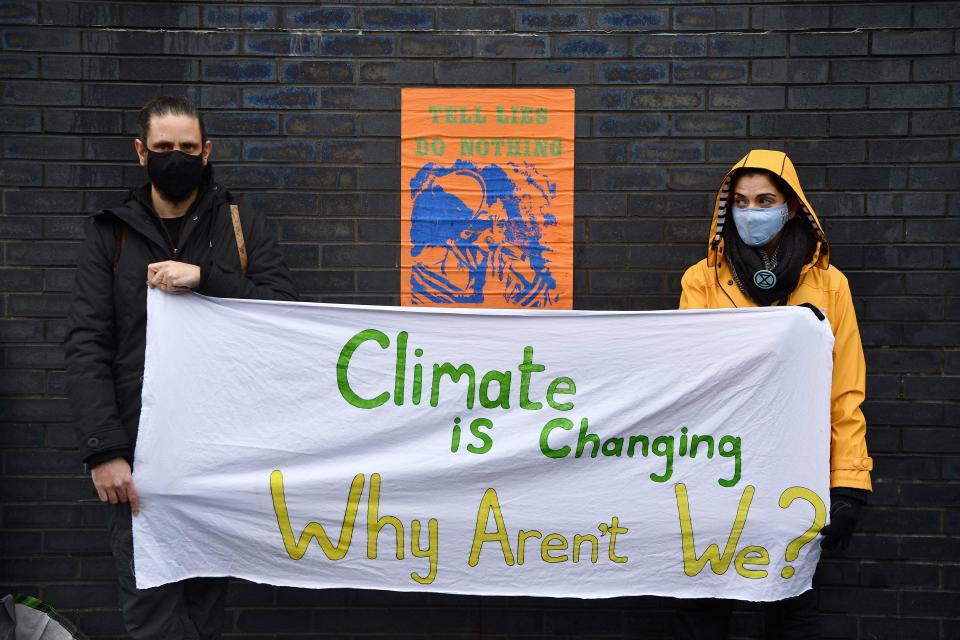Clear differences on climate between Ron DeSantis, Nikki Fried
- Oops!Something went wrong.Please try again later.
- Oops!Something went wrong.Please try again later.
- Oops!Something went wrong.Please try again later.
Attending the United Nations Climate Change Conference last month in Glasgow, Scotland, it was clear the international negotiations to reduce global greenhouse gas emissions remain mired down by the intransigence of far too many countries, including our own.
While other nations are encouraged to see the U.S. federal government returning to the U.N. climate change negotiation process, they remain skeptical that U.S. domestic politics can generate a consistently constructive policy on climate change mitigation. They fear the pendulum will swing back in a few short years to the days when Donald Trump refused to participate in any coordinated international effort to slow the man-made climate change catastrophe. Just as the 2016 presidential election resulted in the U.S. rejecting the 2015 Paris Agreement, a future Republican president would likely erase the modest progress made in the 2021 Glasgow negotiation, and progress made in future U.N. meetings.
A similar dynamic is playing out at the state level where the two parties, currently represented by Republican Gov. Ron DeSantis and Democratic Commissioner for Agriculture and Consumer Services Nikki Fried, have adopted very different positions on climate change.
Republicans started by denying climate change was even happening, and under Rick Scott even banned any mention of climate change in state government. Republicans have slowly shifted to pretending as if they had always acknowledged climate change was happening but that it was inevitable and was not due to the human element. Trump says it is simply a Chinese propaganda conspiracy.
For his part, Gov. DeSantis has limited his climate actions to “resiliency” efforts, which are basically the fortification of our communities and coastlines to delay the inevitable damage and body count that will be inflicted by abrupt climate change.
Republicans are content to have us simply pick up the pieces of our shattered communities following each ever-worsening hurricane, flood, fire, tornado and other natural disasters. They are unwilling to take aggressive action on the root cause of the climate emergency — greenhouse gas emissions from our cars, homes, industries and farms. Focusing on resilience is the equivalent of fighting a war simply by digging bunkers in which to cower rather than engaging the actual enemy.
Nikki Fried, by contrast, bravely introduced significant climate action plans within her first few months as commissioner of agriculture. The FDACS Florida Energy and Climate Plan is a key step on the road to a carbon-neutral Florida, and lightyears beyond any legislation successfully passed in Tallahassee. It lays out a timeline to transform the state’s failing energy sector (currently reliant on fossil fuels such as natural gas), details required investments into clean energy-reliant transportation and assistance toward low-income communities that would benefit from clean energy transformation.
Complementing the legislative recommendations contained in the Florida Energy and Climate Plan were the speakers selected to deliver presentations at the Climate and Energy Summit held immediately after the U.N. gathering. There were representatives from the solar industry, public schools, the transportation sector and more. Many of these speakers emphasized the need to dramatically transform their industries in the direction of carbon neutrality, and take the solar business to important new heights.
Another important demonstration was the talk by Campus Climate Corps, which called for investment into carbon accounting to help determine carbon usage by Florida’s agriculture and other industries. This key step would pave the way for a properly designed and managed carbon farming system which would dramatically reduce, if not completely eliminate, the carbon emissions for modern farming. Given that farming dominates Florida’s carbon budget and is the No. 2 industry in the state, it is important to address this massive source of carbon emissions.

Commissioner Fried recently showcased a new initiative by state Democrats to mitigate climate emissions by much steeper numbers than previously considered in any legislation proposed in Tallahassee prior to 2021. The bill would create a statewide mitigation strategy to vigorously reduce statewide greenhouse gas emissions by 50% by 2030, 90% by 2050 and 100% by 2055.
If we expect our children and theirs to have a livable planet and prosperous Florida, then it is absolutely essential that we today seriously compare the records and policies of each of our elected officials so we know which are properly leading Florida to a safer, carbon-free future. There are clear differences between their performance as stewards of our planet and our future.
Rock Aboujaoude Jr. is a graduate student at the University of Florida, where he studies carbon farming policy. He serves as a director of Campus Climate Corps, a program of Alpha Epsilon Lambda, the national graduate student honor society. Aboujaoude also serves as director of legislative affairs for the National Association of Graduate-Professional Students. The opinions expressed in this column are his own and not official positions of these organizations.
Join the conversation
Send a letter to the editor (up to 200 words) to letters@gainesville.com. Letters must include the writer's full name and city of residence. Additional guidelines for submitting letters and longer guest columns can be found at bit.ly/sunopinionguidelines.
Journalism matters. Your support matters.
Get a digital subscription to the Gainesville Sun. Includes must-see content on Gainesville.com and Gatorsports.com, breaking news and updates on all your devices, and access to the Gainesville.com ePaper. Visit www.gainesville.com/subscribenow to sign up.
This article originally appeared on The Gainesville Sun: Rock Aboujaoude Jr.: Compare climate plans of DeSantis, Fried

